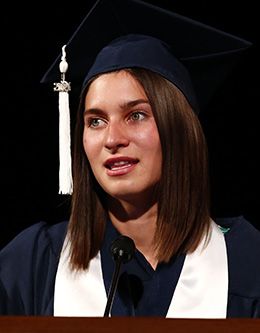Elder Nelson, President Worthen, distinguished faculty and guests, family, friends, and fellow graduates: Good afternoon.
In October 2012 I realized that I would not be getting a master’s degree—at least not right away. Devon and I had been married just a couple months, and, after praying and going to the temple, we decided to start our family. At that time I was halfway through my education. In two years I was supposed to have participated in a study abroad program, completed summer internships, graduated, and been accepted to a master’s program. But after doing the math, I realized that even getting my undergraduate degree would be difficult with a young baby—and it has been. I knew that getting a master’s degree afterward would be nearly impossible for me and for our young family.
Until this point I thought the purpose of my education at Brigham Young University was purely academic. I had come here to get a great education. BYU was the perfect stepping-stone for me to achieve professional service and success. But when my plans for graduate study and professional life were delayed, I had to reevaluate the purpose of my BYU education.
What is the purpose of a BYU education? The answer is written clearly on a plaque at the entrance to campus. It is an adage we have all seen many times: Enter to Learn; Go Forth to Serve. But what does this actually mean? How are we to serve? As a young college student I thought that “go forth to serve” meant “go forth and get an awesome job.” I was wrong; service means more than that. The Lord requires service with our whole souls and with all of our knowledge, not just the academic knowledge or technical skills we have learned in our degree programs. Doctrine and Covenants 4:2 invokes, “O ye that embark in the service of God, see that ye serve him with all your heart, might, mind and strength.” Truly serving God requires our emotions, physicality, willpower, and intelligence.
As I reevaluated my plans, I learned that my college education would be just as important to my success as a wife and a mother as it would be to my success in the professional world. My understanding of different cultures and people will help me raise open-minded and empathetic children. My improved knowledge of scripture and Church history will help me teach my children and serve in Church callings. More than anything else, in college I have learned how to learn, and that is a skill that I will continue to use as I approach many challenges and opportunities in the coming years.
Though a BYU education starts in academics, it doesn’t end there. Rather, a BYU education is multifaceted. Throughout our time at BYU we have learned how to live with people who are different from us. We have learned to love them and to value the ways they are different from us. We have learned more about the gospel from religion classes and from serving in callings. We have learned how to be self-sufficient by doing our own laundry, washing our own dishes, and holding down a job—all while continuing to take classes. All of these skills that a BYU education has taught us are gifts we can share with others. They are tools that we can use to serve the people around us, wherever we find ourselves.
On the cusp of graduation, I find myself in a place that I could not have anticipated: married, with a one-year-old son. Though unexpected, I know it is the exact place in which the Lord wants me to serve right now.
My experience aside, many of us will go on to get jobs or internships. Some will go on to graduate school, others to missions or self-employment. All of us will be surprised by where our education takes us in the coming years, and none of us will be able to anticipate the opportunities we will have to serve. Regardless of where we end up after graduation, going forth to serve will require all that we have learned as students in this institution. We will have opportunities to serve in every context if we look for them. Our service is vital to our homes, communities, wards, and stakes.
As you sit here in this congregation, ask yourself, “How can I serve?” Think of all you have learned during the past four or so years. How will you share the blessings of your BYU education? Who can you teach, uplift, comfort, or love? As you reflect on your experience at BYU and plan your future, be grateful for your BYU education and remember your responsibility to go forth and serve.
© Brigham Young University. All rights reserved.

Phoebe Romney Cook spoke as the representative of her graduating class at BYU commencement on 14 August 2014.


